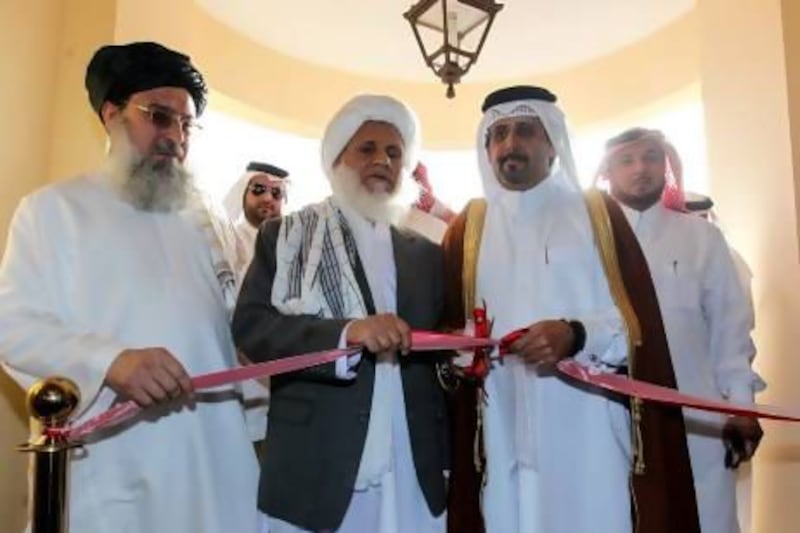DOHA // Planned peace talks with the Taliban were in disarray late on Wednesday after first the Afghan president Hamid Karzai and then the United States pulled out.
Mr Karzai said he would boycott the talks until they were led by Afghans.
The negotiations had been expected to begin today after the Taliban opened its new office in Qatar and a US diplomatic delegation arrived in Doha late yesterday, but last night the US state department said no talks were now scheduled.
"Reports of a meeting scheduled are inaccurate," spokeswoman Jen Psaki told reporters, saying that Washington had "never confirmed" any specific meeting. "We are now in consultations with the Afghan leadership and the High Peace Council on how to move forward."
The negotiations had been expected to begin as early as today after the Taliban opened its new office in Qatar and a US diplomatic delegation arrived in Doha late yesterday.
Mr Karzai's decision to boycott the talks had already cast doubt over whether the talks, billed as a possible end to 12 years of war in Afghanistan, can consolidate security gains.
The Afghan president said he objected to American officials' promise to engage directly in talks with the Taliban insurgents before the Afghan government joined the conversation.
Mr Karzai's office also said it was pulling out of continuing Afghan-US security talks, which must reach an agreement if Washington is to maintain soldiers in Afghanistan after a Nato combat mission ends in 2014.
Barack Obama said his administration had always anticipated "difficult negotiations".
"We had extensive conversations with President Karzai both before and after the Taliban opened the office in Doha," the US president said in Berlin, where he met the German chancellor Angela Merkel.
"We had anticipated at the outset that there would be areas of friction - to put it mildly - to get this thing off the ground."
The withdrawal from both sets of negotiations came after the Afghan president was angered by the handling of the configuration of peace talks, and the opening of the Taliban's political office in Doha.
Mr Karzai said the Afghan High Peace Council would not be involved in peace talks until "foreign powers" allowed the process to be led by Kabul.
"As long as the peace process is not Afghan-led, the High Peace Council will not participate in the talks in Qatar," he said.
"In view of the contradiction between acts and the statements made by the United States of America in regard to the peace process, the Afghan government suspended the negotiations, currently under way in Kabul between Afghan and US delegations on the bilateral security agreement."
The Afghan government said the way the Taliban's office had been set up gave undue legitimacy to the group.
The office in the heart of Doha is called the Islamic Emirate Of Afghanistan and has a villa design that fits in well among many small countries' embassies.
Shafiullah Nooristani, a member of the High Peace Council, said the use of the name violated agreements Mr Karzai's government had made with the US and caused diplomatic issues for Afghanistan.
In an attempt at damage control, Qatar's foreign ministry said yesterday the Taliban had violated an agreement with them to call the office the Political Bureau of the Afghan Taliban in Doha. The ministry did not say if the Taliban would be forced to change the name.
This is the latest incident to underline the troubled relations between Mr Karzai and his American allies, which have degenerated into public spats in the past.
On Tuesday it appeared they had found a way to move forward when the peace talks with the Taliban were announced.
Mr Karzai has previously opposed direct Taliban-US talks, but said on Tuesday he had ordered envoys to Qatar to try to negotiate with the Taliban as US officials said their own talks with the group could begin this week, though he stressed that any dialogue should move from Doha to Afghanistan as soon as possible.
Qatar, the host of the promised talks, said it had "exerted strenuous efforts to reach a convergence of view between the US government officials and the representatives of Taliban from Afghanistan. These efforts resulted in the agreement on the opening of a political office for the Afghanistan Taliban in Doha."
President Obama welcomed the talks as an important first step, but warned of a bumpy road ahead. He insisted the Taliban would have to renounce ties to Al Qaeda, halt violence and commit to the protection of women and minorities. He warned that Nato forces remained fully committed to battling Al Qaeda.
Meanwhile, the Taliban, who broke off contact with the Americans last year and have always refused to negotiate with Kabul, said their new office would "open dialogue between the Taliban and the world."
But a Taliban spokesman in Qatar, Mohammad Sohail Shaheen, also confirmed the group would continue to attack US targets in Afghanistan at the same time as any talks.
"There is no ceasefire now. They are attacking us and we are attacking them," Mr Shaheen said, and the Taliban "simultaneously follows political and military options".
Yesterday the Taliban claimed an overnight rocket attack that killed four US troops at Bagram, the largest military base in Afghanistan.
edickinson@thenational.ae
* Additional reporting by Taimur Khan in New York, Reuters, the Associated Press and Agence France-Presse





